|
|
|
Sort Order |
|
|
|
Items / Page
|
|
|
|
|
|
|
| Srl | Item |
| 1 |
ID:
108906
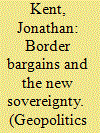

|
|
|
|
|
| Publication |
2011.
|
| Summary/Abstract |
From 2001 to 2005 Canada and the US dramatically altered the way each country views its border. In response to the attacks on New York City and Washington DC, Canada and the US entered into three important partnerships: the Smart Borders Agreement (SBA), the Container Security Initiative (CSI), and the Security Prosperity Partnership (SPP). These arrangements will be conceptualised here as "tacit bargains" whereby Canada provided the US with security in hope of renewed trust and economic accessibility. These "tacit bargains" required a concession of traditional state sovereignty so that stable and predictable relations between both countries could continue. While this process is ostensibly a violation of state sovereignty, the argument presented here is that these three "tacit bargains" represent a transition of "old" sovereignty to "new" sovereignty.
|
|
|
|
|
|
|
|
|
|
|
|
|
|
|
|
| 2 |
ID:
108909
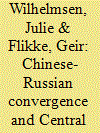

|
|
|
|
|
| Publication |
2011.
|
| Summary/Abstract |
Since the mid-1990s, China's and Russia's strategic outlooks have gradually been converging. The two great powers have incrementally shed their mutual apprehensions and started a comprehensive and multifaceted cooperation in the Shanghai Cooperation Organisation (SCO). Simultaneously, as the rift between the US and Russia has opened up and the differences in their views on regional security in Eurasia have become even more evident, China's and Russia's quests for new models for regional security in Central Asia have gained ground. Enveloping the Central Asian states on issues of collective and energy security, both states are sternly against US dominance in international affairs. In this sense, they have initiated a new geopolitical script around Central Asia. As their mutual interests hold sway over US influence regionally, questions remain on whether specific interests are compatible, or harbour new rivalries. Chinese-Russian interaction in Central Asia reveals that there might be limits to the future expansion of their partnership.
|
|
|
|
|
|
|
|
|
|
|
|
|
|
|
|
| 3 |
ID:
108912
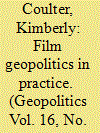

|
|
|
|
|
| Publication |
2011.
|
| Summary/Abstract |
This essay demonstrates how critical geopolitics of film can benefit from attention to behind-the-scenes practices in films' lives by examining "territorial appeals": invocations of territorial interest or identity to justify a project or win support for a position. By tracing marketing strategies in the emergence of The Miracle of Bern, a 2003 film that celebrates West Germany's World Cup football victory over Hungary in 1954, the essay shows opportunities and limitations of territorial appeals to win production funds, find distributors, and shape discourse at home and abroad. This study of negotiations among a variety of actors and institutions reveals how marketing - in all its forms - is on the "front lines" of national identity construction and perception.
|
|
|
|
|
|
|
|
|
|
|
|
|
|
|
|
| 4 |
ID:
108904
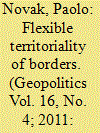

|
|
|
|
|
| Publication |
2011.
|
| Summary/Abstract |
To what extent do boundaries shape state-centred scales of discourse and action? In an attempt to answer this question, the article delves into one of the key ambiguities characterising boundaries: their being both static markers of sovereign jurisdictions and socially produced and reproduced institutions. Drawing on Foucauldian notions of 'productive power', and taking as a referent the Durand Line, the paper elaborates upon Robert Sack's contribution, and proposes an analytical framework that simultaneously captures, while maintaining distinct, two dimensions of territoriality: territoriality as a strategy operating in a socially emptiable space, and territoriality as it unfolds in its actuality. It argues that such framework provides insights on the multi-scalar and place-specific power relations that define the social context in which the Durand Line unfolds, offering important tools for the assessment of boundaries' role in the reproduction of society's contradictions and inequalities. The flexible territoriality of the Durand Line is defined by its simultaneous, and more or less successful, attempt at ordering space across multiple dimensions .
|
|
|
|
|
|
|
|
|
|
|
|
|
|
|
|
| 5 |
ID:
108908
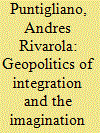

|
|
|
|
|
| Publication |
2011.
|
| Summary/Abstract |
The main tenet of this article is to argue that the process of regionalisation in Latin America is entering into a new phase, where South America is consolidating an own process of regional integration. From being not more than a geographical expression, South America is rapidly becoming a political and economic entity with increasing international actorhood. One important difference to the past is that there is now a 'core state', Brazil, with a clear strategy directed towards deepening South American integration. Yet, Brazil is not alone; there is also an increasing convergence with other South American states and old rivalries are being substituted for increased cooperation in areas such as economy, infrastructure, energy, security or aid. As this article explains, the logic of action of the forces behind the process of integration can be understood by analysing the evolution of South American geopolitical current called 'geopolitics of integration'.
|
|
|
|
|
|
|
|
|
|
|
|
|
|
|
|
| 6 |
ID:
108905
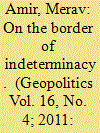

|
|
|
|
|
| Publication |
2011.
|
| Summary/Abstract |
Drawing on a perspective which takes into account the convergences of sovereign and biopolitical ruling apparatuses, the aim of this article is to provide a comprehensive view of the Separation Wall constructed by Israel in East Jerusalem, and, through it, of Israeli control of Palestinian East Jerusalem. Neither a comprehensive border, nor a mere barrier, the Separation Wall which is being constructed in Jerusalem operates to reinstates sovereign power in arrays of governmentality for the purpose of drawing on the ability of sovereignty to appropriate legitimacy for the territorialisation of governmentality. This article claims that these territorialised arrays of governmentality give rise to processes of racialisation, by maintaining a grip on the communities of Palestinians in East Jerusalem and sustaining them in an intermediate position, standing in the way of their full integration into the Israeli population while severing their existing connections with the Palestinians in the West Bank.
|
|
|
|
|
|
|
|
|
|
|
|
|
|
|
|
| 7 |
ID:
108907


|
|
|
|
|
| Publication |
2011.
|
| Summary/Abstract |
The revival of geopolitics in post-1989 Italy is at once a rather straightforward and perplexing matter. On the one hand, the renewed appeal that geopolitical thinking has enjoyed in International Relations (IR) circles has been well documented and could hardly be downplayed. On the other hand, however, the recourse to geopolitics has often boiled down to an undifferentiated and often convoluted use of its terms, approaches and theories. In this article we argue that the rationale of such a revival has been less to import geopolitical knowledge into IR and more to confer legitimacy and respectability to the analyses put forward by scholars and practitioners. It is no chance, in fact, that the geopolitics-inspired academic discourse has been progressively recognised as a way, if not the way, to discuss international affairs in post-1989 Italy. The central puzzle to be investigated behind the revival of geopolitics in Italy is thus how such a discourse has managed to gain and retain a powerful status in Italian IR academia and, most importantly, why.
|
|
|
|
|
|
|
|
|
|
|
|
|
|
|
|
| 8 |
ID:
108910
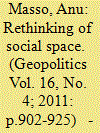

|
|
|
|
|
| Publication |
2011.
|
| Summary/Abstract |
This article analyses the changes in social space, based on perceptions of individuals in a transition country, Estonia. The Marxist approach to social space is used as a theoretical framework. The article originates from the premise that the changes in individuals' conceptual 'apparatus' are needed for keeping up with spatial developments related to capitalism. Analysis of empirical data collected in 2008 focuses on patterns of spatial perceptions of three generations of the two main ethno-linguistic groups in Estonia, the Estonian ethnic majority and the Russian-speaking minority. The results show perception of space is significantly correlated with indices of everyday social and cultural practices and individual wealth and reveal the geographical and ideological division of the world as seen by the inhabitants of a transition country. The article suggests transition has caused spatial disruption particularly amongst the ethnic minority. Increasing ethnic differences from one generation to another infers increasing societal inequality. The quid pro quo relationship between geopolitical changes and economic transition at the individual level is consequently more clearly defined.
|
|
|
|
|
|
|
|
|
|
|
|
|
|
|
|
| 9 |
ID:
108911
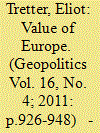

|
|
|
|
|
| Publication |
2011.
|
| Summary/Abstract |
During the 1970s and 1980s the "cultural sector" became one of the primary motors for wealth creation in the European Community. At the European and national scales, a group of actors helped transform Europe's vast array of practices and services (tourism, heritage, books, audio-visual products, etc.) into "cultural industries" and pushed the EC to develop a common cultural policy to support these industries. Documenting these changes at the European scale, I argue that the perceived impact of cultural policy for particular national economic competitiveness was also significant. Italian MEPs and members of Italy's national government were especially important, as they fought to protect the country's historical heritage and promote tourism. France pushed the strongest and I show how that country's efforts were primarily intended to protect its audio-visual and publishing industries from the EC internal market's liberalisation policies, which were vocally supported by Britain because they would have served that county's national economic interests.
|
|
|
|
|
|
|
|
|
|
|
|
|
|
|
|
|
|
|
|
|